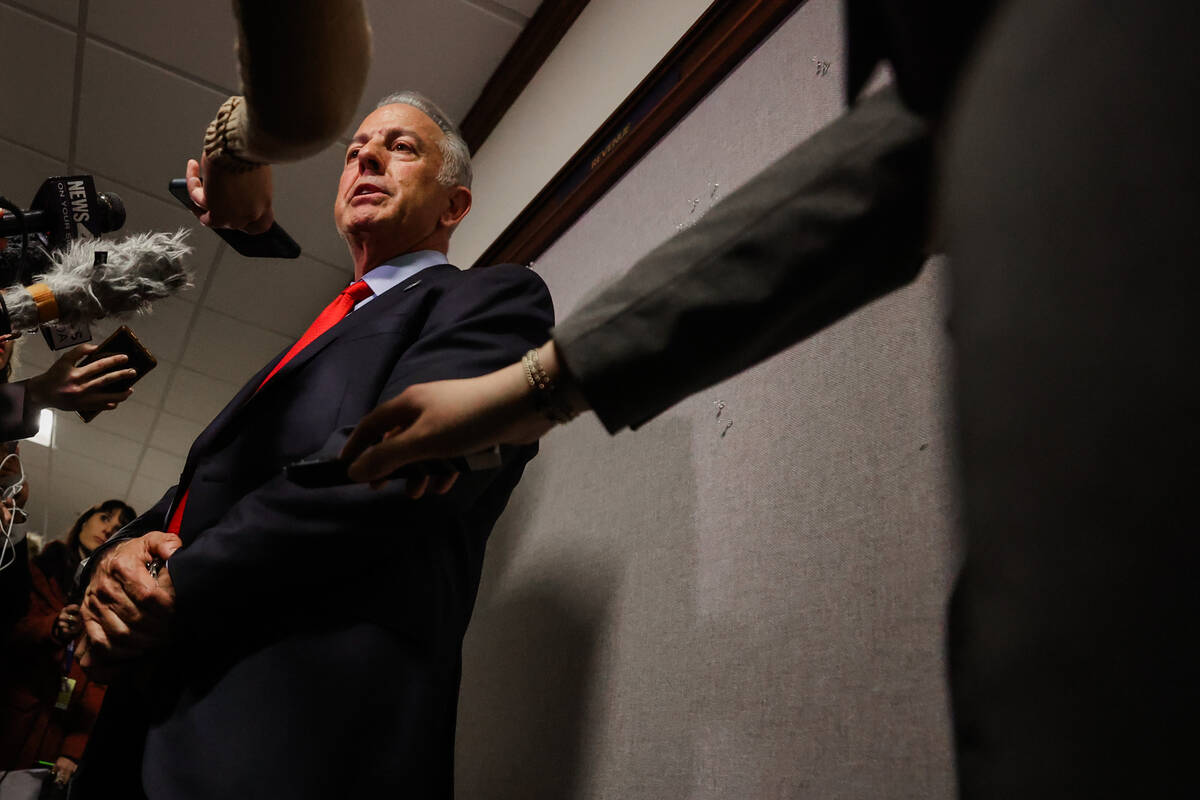‘I do not like using the veto pen’: Nevada governor sets new record
Gov. Joe Lombardo already had a reputation for a mighty veto pen when he set a record for the highest number of single-session vetoes at 75 during his first session two years ago.
But in 10 days following the Nevada Legislature’s adjournment on June 2, the Republican governor shattered his record, ending the 83rd session in Carson City with 87 vetoes.
Not only does Lombardo have the highest number of vetoes per session, he has also surpassed the most total vetoes in a governor’s tenure. That record was previously held by Republican Gov. Brian Sandoval, who rejected 97 bills over four regular sessions.
“I do not enjoy using the veto pen, but as Governor, it is my responsibility to protect Nevadans from legislation that goes too far, expands government unnecessarily, or creates unintended consequences that hurt families, businesses, or our economy,” he said.
Friday was the last day the governor could sign or veto legislation that reached his desk. He approved of 85.6 percent of all bills passed by the Legislature, or 518 of the 605 bills he received.
Politicians and observers say the record-breaking number of vetoes reflects disagreement in the divided government in Carson City.
Expectations and surprises
State Sen. Fabian Doñate, D-Las Vegas, said he was disappointed that four of his bills were vetoed. They included proposals to revamp street food vendor regulations; to make lacrosse a varsity high school sport; to regulate freestanding emergency rooms and billing; and to adjust wage garnishments.
“Top line is, I think there’s some level of disagreement in terms of the trajectory of the state,” Doñate said, adding that he believed the Democrats passed good legislation on affordability issues. “Ultimately, we were trying to solve the issues that folks are facing as we’re going through an economic downturn. We hope that he continues to understand the ramifications of these decisions, because ultimately, it does affect working Nevadans, and that’s what we were trying to fix.”
Others were pleased with the vetoes and said most fell in line with expectations. Anahit Baghshetsyan, policy analyst for the non-partisan, libertarian-leaning think tank Nevada Policy, said the organization viewed the session as a win for its policy agenda.
“Almost all of the things that we were tracking are now either signed into law or vetoed, mostly in a way that we were expecting to see it,” she said.
Still, some were surprised by several vetoes. Assembly Bill 499, proposing expanded ballot drop box access and implementation of voter ID requirements, was pitched by Assembly Speaker Steve Yeager as a compromise on election reform.
The Las Vegas Democrat worked with the executive office on combining the two policies in the last week of session, shortly after the governor vetoed Yeager’s ballot box expansion proposal. Lombardo said the bill sent to his desk did not have language he proposed to reduce the risk of ballot harvesting and had inconsistencies between ID verification methods for in-person and mail voting.
Liz Luna, incoming executive director of the Assembly Democratic Caucus, said the veto contradicted good-faith discussions between the leaders who sought to find a “balanced and pragmatic approach” to voter ID after a similar ballot question’s widespread approval in 2024. (The ballot question will be returned to voters in 2026.)
“By vetoing this bill, the Governor has not only walked away from bipartisan compromise, but also from the will of the people he claims to represent, thus elevating politics over people,” Luna said in a statement.
Another seemingly unforeseen veto was SB 217, which would have established a statutory right to in vitro fertilization and expanded Medicaid coverage for infertility diagnosis and treatment. Senate Majority Leader Nicole Cannizzaro called the rejection political in a Friday news release.
“Even Donald Trump has backed efforts to expand IVF, but Lombardo is picking out-of-state extremists over protecting Nevada doctors and patients,” Cannizzaro, D-Las Vegas, said in a statement. “By vetoing this bipartisan bill, Lombardo has turned his back on ordinary Nevada families who need a little help to overcome the hardships of infertility in order to experience the joy of parenthood.”
The legislation passed the Assembly on a party-line vote and passed the Senate 15-5, with Republican Sens. Lori Rogich and John Steinbeck joining Democrats in support. But Lombardo said the bill was “fiscally impossible” because of the state’s Medicaid budget, which could be subject to cuts later this year.
What the record means
Observers said the record-setting vetoes are a sign of a lack of cooperation in Carson City. Chris Giunchigliani, a former Democratic assemblymember and teachers’ union leader, said term limits and a 120-day session can limit what new lawmakers are able to do, but she added that politics also play a role.
“What it says to me is that things have become meaner and pettier, and everybody’s kind of lost their way on who they’re there to represent,” she said. “There’s a difference between getting elected and learning how to govern.”
Giunchigliani worked with Sen. James Ohrenschall, D-Las Vegas, on a bill to require incumbents to live in the district they represent during their entire term.
SB 428 passed on a party-line vote in favor of Democrats in the Senate and unanimously in the Assembly. But Lombardo said in his veto message he believed the bill did not protect candidates’ privacy because residential addresses could be considered part of the public record.
Doñate said he felt there was less cooperation between lawmakers and the governor’s office this session, leading to bills that advanced without knowing the governor’s opinion and why he would veto a bill.
“I think it’s saddening that we’ve arrived to that point in our political process where we can’t even have discussions as to how we can fix issues that we see are prevalent in our community, and don’t communicate that to each other, and ultimately Nevadans are left behind when we arrived to a veto,” he said.
Baghshetsyan said the high number of vetoes was a sign of a deeper disagreement between the Legislature and the executive branch.
She pointed to several bills vetoed this week with policies that were like ones from the previous session. Lombardo used some veto messages to point out those similarities.
“Why are the legislators putting him in the position to utilize his veto pen when he’s consistently voiced what are his lines and what are his expectations?” she said.
To Giunchigliani, lawmakers’ next steps during the interim before the 2027 session should be to evaluate those vetoes, talk to their constituents about why the legislation failed and consider how to move forward with the policy, if at all.
“Spend the next year and a half figuring out either how to make it better or is it even worthwhile?” she said.
Contact McKenna Ross at mross@reviewjournal.com. Follow @mckenna_ross_ on X.




















